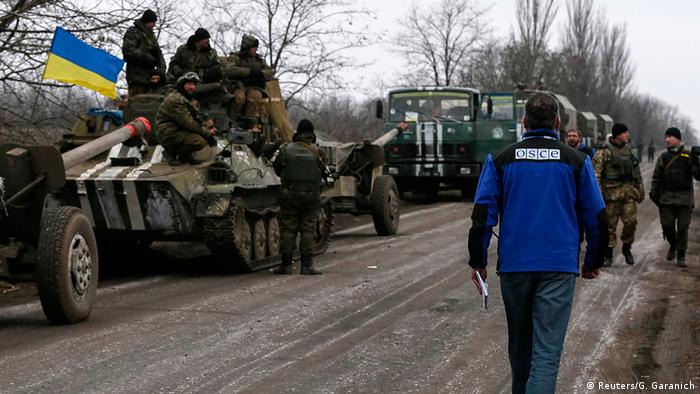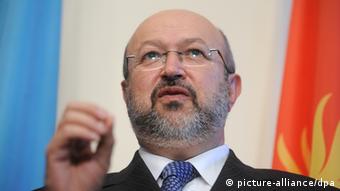| From: | Victor Okpanachi |
|---|

Moscow and Berlin have asked the OSCE to double the number of its monitors in eastern Ukraine to 1,000. But the organization's head said the number of observers isn't his largest concern for peace in the region.
The German and Russian foreign ministers, Frank-Walter Steinmeier and Sergey Lavrov, urged theOrganization for Security and Cooperation in Europe (OSCE) to increase its number of observers in Ukraine's conflict-ridden east.
"The ministers called on the OSCE Permanent Council to make a quick decision on extending the mandate of its special monitoring mission, ramping up its size to 1,000 observers and assigning it additional technical and financial resources," the Russian ministry said in a statement after Lavrov and Steinmeier spoke on the phone.
The two ministers also acknowledged "progress on issues of observing the truce and withdrawal of heavy weapons by Ukrainian troops and Donetsk and Luhansk rebels," the statement added.
Around 450 monitors have currently been deployed in eastern Ukraine to monitor the ceasefire after Kyiv and the pro-Russian separatists, along with Germany, Russia and France, hammered out a peace deal last month in Belarus' capital, Minsk. The ceasefire officially came into effect on February 15, butproved fragile with rebels and Kyiv indulging in skirmishes over border controls and withdrawal of heavy weapons.
More access for truce monitors
Ukraine also agreed to an increase in the number of OSCE observers following a discussion among officials from France, Germany, Russia and Ukraine in Berlin, the German foreign minister said on Friday.
Also on Friday, OSCE Secretary General Lamberto Zannier said his officials were still being denied full access to monitor the truce.
"There are areas we simply can't reach," Zannier told the AFP news agency in Riga, where he was participating at an EU foreign ministers meeting.
The OSCE mission had earlier reported that its capabilities were limited due to "lack of information on whereabouts of landmines and restrictions imposed by third parties."
Earlier this week, leaders of France, Germany, Russia and Ukraine agreed to send OSCE observers to flashpoints in eastern Ukraine where the ceasefire between the rebels and Kyiv was being violated. These included the Donetsk airport area, which was seized by pro-Russian separatists in January.
The Ukraine conflict, which began with the Russian annexation of Crimea last year, has killed more than 6,000 people.


No comments:
Post a Comment